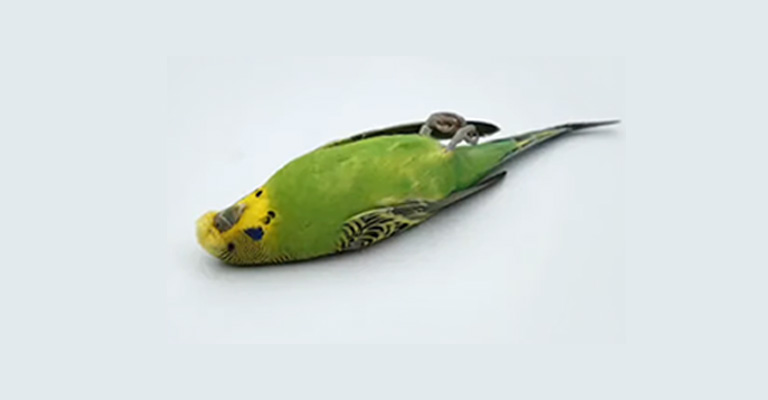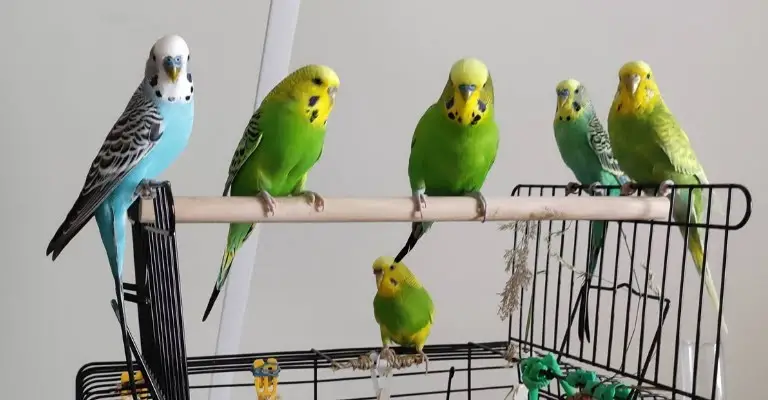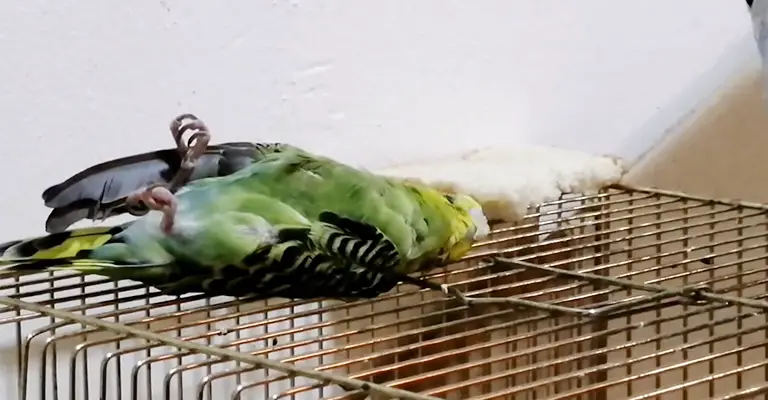Bringing a new pet into your home is often a joyous occasion filled with hope and anticipation. However, the excitement turned to heartbreak for me when my beloved budgie passed away just one week after becoming a part of our family.
This sudden loss left me bewildered and searching for answers. In this article, we will delve into ‘My budgie died within a week of bringing her – why’, shedding light on the common pitfalls that new bird owners may unknowingly encounter.
Through this unfortunate experience, I hope to raise awareness about the importance of proper care, early detection of health issues, and creating a nurturing environment for our feathered companions.
Join me as we explore the journey of understanding why my budgie’s life was tragically cut short, and how we can learn from this painful experience to ensure the well-being of our cherished avian friends.

My Budgie Died Within a Week of Bringing Her – Why?
While the exact reasons can only be specified by an expert vet, there are several common reasons why a budgie might pass away shortly after being brought home. Here are some possible factors to consider:
Stress
Budgies are sensitive birds, and the stress of a new environment, handling, or changes in routine can be overwhelming. This stress may weaken their immune system and make them more susceptible to illness.
Health at Purchase
Budgies can have underlying health issues when purchased from pet stores or breeders. These issues may not be apparent at first, and a seemingly healthy budgie may have an undetected illness.
Improper handling, such as excessive force or rough treatment, can cause physical injuries or stress to the budgie, which may lead to health problems or premature death.
Quarantine
It’s crucial to quarantine new birds in a separate room for a few weeks to ensure they are not carrying any contagious diseases that could harm your existing birds.
Keeping too many budgies in a small enclosure can lead to stress, aggression, and the spread of diseases.
Diet and Nutrition
Poor diet or inadequate access to clean water can lead to health problems in budgies. Ensure you provide a balanced diet with fresh fruits, vegetables, and a variety of seeds.
Temperature and Environment
Sudden temperature changes or exposure to drafts can be harmful to budgies. Keep them in a stable, warm environment with proper ventilation.
Budgies are social birds, and a lack of interaction and companionship can lead to loneliness and stress, which can impact their health.
Toxins
Budgies are sensitive to toxins in their environment. Ensure there are no household chemicals, toxic plants, or fumes that could harm them.
Disease
Even with proper care, budgies can contract diseases like respiratory infections, mites, or other illnesses that can be fatal if not treated promptly.
Veterinary Care
Regular check-ups with an avian veterinarian are essential to detect and treat any health issues early. Please remember that budgie care can be complex, and many factors can contribute to their well-being.
It’s essential to consult with an avian veterinarian to discuss your specific situation and ensure the health and happiness of your future pets.
How to Keep a Budgie Alive at Home Environment?

Keeping a budgie alive and thriving in a home environment requires attention to several key aspects of their care. Here’s a guide on how to ensure the well-being of your budgie:
Cage and Environment
Choose an appropriately sized cage, allowing for room to fly and stretch wings. Place the cage in a draft-free area away from direct sunlight and extreme temperatures. Provide perches of varying diameters and textures for foot health.
Diet
Offer a balanced diet consisting of high-quality budgie seed mix or pellets. Supplement with fresh fruits and vegetables like apples, carrots, and leafy greens. Fresh water should always be available in a clean dish.
Social Interaction
Budgies are social birds; spend time interacting with them daily. Consider getting a companion budgie if possible, as they are less likely to become lonely.
Toys and Enrichment
Provide a variety of toys, including swings, mirrors, and puzzles, to stimulate mental and physical activity. Rotate toys regularly to prevent boredom.
Hygiene
Clean the cage and food/water dishes regularly to prevent the growth of harmful bacteria. Bathe or mist your budgie occasionally to help them maintain their plumage.
Healthcare
Schedule regular check-ups with an avian veterinarian. Watch for signs of illness such as changes in behavior, droppings, or breathing.
Dietary Supplements
Consider providing a calcium supplement if your budgie is not getting enough from its diet. Consult a vet before adding any supplements.
Noise and Environment
Budgies are sensitive to loud noises; keep their environment calm and quiet. Avoid exposure to fumes, such as those from non-stick cookware, as they can be toxic to birds.
Allow your budgie time outside the cage to stretch its wings and exercise in a safe, enclosed area.
Training and Bonding
Train your budgie using positive reinforcement methods for behaviors like stepping up onto your finger. Building a bond of trust with your budgie is essential for their mental well-being.
Emergency Preparedness
Familiarize yourself with an avian emergency plan and locate an avian veterinarian in your area. Remember that each budgie has its own personality and preferences, so it’s essential to observe and adapt to their individual needs.
Regular care, attention, and love will go a long way in ensuring your budgie’s health and happiness in your home environment.
Why Did My Budgie Die with Eyes Open?

In this section, we will offer some general information that might help you understand why your budgie passed away with its eyes open. Please keep in mind that it’s essential to consult a qualified avian veterinarian for a definitive explanation. Here are a few possible reasons:
Sudden Illness or Injury
Your budgie might have suffered from a sudden illness or injury that led to its passing. In such cases, they may not have had time to close their eyes or show typical signs of distress.
Stress
High levels of stress or anxiety can impact a bird’s health and behavior. If your budgie experienced extreme stress, it might not have had the chance to close its eyes, even in distress.
Shock
Sometimes, severe shock or trauma can lead to unexpected and sudden deaths in birds. This might be accompanied by open eyes.
Underlying Health Issues
Budgies can hide signs of illness very well. Your budgie may have had an underlying health issue that wasn’t apparent until it was too late.
Natural Behavior
In some cases, budgies might not close their eyes completely while sleeping or resting. This is more common when they’re in a secure and comfortable environment.
To understand the specific reason for your budgie’s passing, it’s crucial to consult with a veterinarian who can perform a post-mortem examination (necropsy) and provide you with a more accurate explanation.
How Do I Know If My Budgie Is Sick?

Recognizing if your budgie is sick is crucial for its well-being. Here are some common signs that may indicate illness in budgies:
Physical Symptoms
Pay attention to changes in the color, consistency, or frequency of droppings. Diarrhea, blood in droppings, or excessive urate can be signs of illness.
A budgie that keeps its feathers fluffed up constantly might be trying to conserve body heat due to illness. If your budgie suddenly refuses to eat or eats significantly less than usual, it could be a sign of illness.
Lethargy
A sick budgie may become less active, spending more time sitting at the bottom of the cage or on a perch without moving much. Watch for any unusual or hunched postures that might indicate discomfort or pain.
Labored Breathing
Rapid or labored breathing, tail-bobbing, or audible wheezing can signal respiratory problems.
If your budgie is constantly scratching or grooming itself excessively, it might be trying to alleviate discomfort from mites or other skin issues.
Eye and Nose Symptoms
Water or discharge from eyes or nostrils can be signs of infections or respiratory problems. Swollen or puffy eyes could indicate an eye infection or injury.
Tail Bobbing, Feather, and Balance
Budgies should maintain their balance well. Any signs of wobbling or unsteadiness might indicate illness.
Healthy budgies have bright and clean feathers. A budgie with disheveled, dull, or soiled feathers may be ill.
FAQs
You should clean your budgie’s cage regularly. Daily spot-cleaning to remove droppings and discarded food is essential.
A thorough cage cleaning with fresh bedding should be done at least once a week or as needed to maintain a clean and healthy environment.
Budgies are comfortable in temperatures ranging from 65°F to 80°F (18°C to 27°C). Avoid exposing them to extreme cold or heat, and make sure their cage is placed away from drafts and direct sunlight.
Yes, budgies can enjoy a variety of fresh fruits and vegetables as part of their diet. However, these should complement their primary diet of budgie seed mix or pellets.
Offer fresh produce in moderation, and ensure it’s clean and free from pesticides.
Budgies are social birds and thrive on companionship. While they can be kept as solitary pets, they generally benefit from the company of another budgie.
A companion can provide mental stimulation and prevent loneliness, but introducing them should be done gradually.
Training a budgie to talk or perform tricks takes patience and consistency. Start with simple commands and positive reinforcement, such as offering treats or praise when they respond correctly. Repetition and short, frequent training sessions are key to success.
Conclusion
The loss of my budgie within a week of bringing her into my life was a deeply saddening experience, but it also served as a powerful reminder of the responsibilities that come with pet ownership.
While we may never know the exact cause of her untimely passing, it is clear that ensuring the health and happiness of our feathered friends requires diligence and education.
Regular vet check-ups, a balanced diet, a safe living environment, and providing mental and physical stimulation are essential components of responsible pet ownership.
Through sharing my story, I hope to prevent others from facing the same heartbreak and to inspire a commitment to the well-being of all pets, no matter how small.
Let us remember that every creature in our care deserves a happy and healthy life, and it is our duty to provide just that.